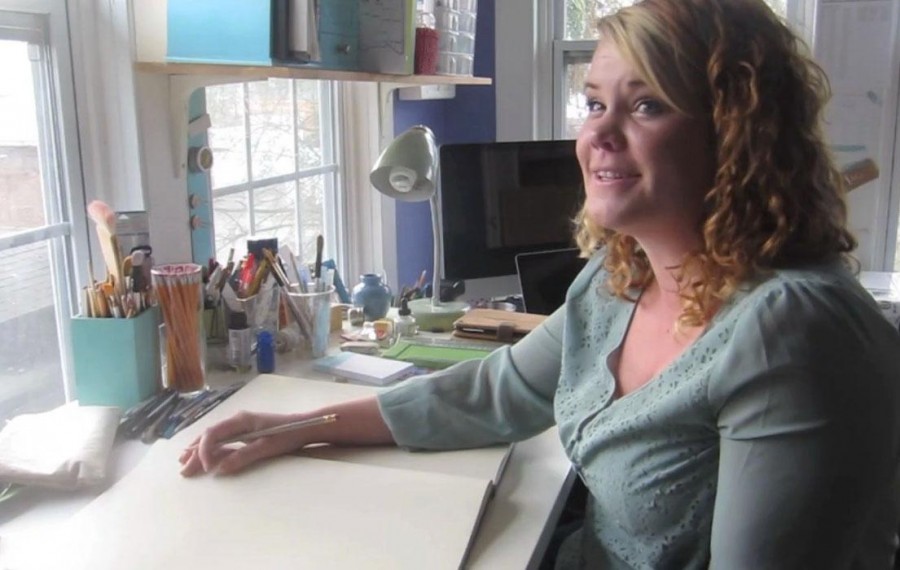Graphic designer Liz Cooke’s path to becoming a business owner began one year ago with an “Ah Lurve You” greeting card.
Cooke founded her design and print company Lionheart Prints mid-January when she created a line of Valentine’s Day cards.
“I marched around to stores and said, ‘Hey, do you want to carry some of my cards?’ Some stores liked it, and it snowballed,” Cooke said.
Cooke, 27, is a part of a movement of young entrepreneurs in New Orleans who have opened up small businesses.
According to the Greater New Orleans Community Data Center, 501 out of every 100,000 adults in the New Orleans metro area annually start up a new business, exceeding the nation’s rate by 56 percent.
Cooke said that New Orleans is a great city for a small business.
“New Orleans champions the little guy,” Cooke said. “New Orleans wants to see the underdog win. If you have a good product, you price it well and you’re friendly, amazing things will happen.”
In 2011, Forbes listed the city of New Orleans as America’s Biggest Brain Magnet for “drawing people under the age of 25 with college degrees.”
Though Cooke moved to New Orleans not long after earning her bachelor’s degree from University of Oklahoma, she said a startup business wasn’t her initial plan.
It was nearly one year ago when Cooke found out she’d lost her “dream job” at a small print shop in New Orleans. Today, Cooke has prints in various New Orleans stores like Papier Plume, Hattie Sparks and Bon Castor.
She sells her greeting cards online out of her Etsy store, and a sunlit studio in the back of her home houses her desktop computer, two large printers and a collection of pens, pencils and paints.
Working from home is not uncommon for young entrepreneurs, Felipe Massa, Loyola University assistant professor of management, said. He refers to the trend in paper crafts and jewelry making as the “maker movement,” and said it’s well-suited for working out of a home.
“It’s hard to make a living doing these kinds of crafts while also paying the rent in a place like New York City or San Francisco,” Massa said. “Given the cost of living in New Orleans is low, and you have neighborhoods like the Lower Ninth and the Bywater, it’s a good place to set up shop from your house and you have a lot of places to sell.”
Michelle Johnston, Loyola University associate professor of management, has lived in New Orleans for 15 years, and she said she’s seen a lot of people who left New Orleans prior to Hurricane Katrina in 2005 decide to return to the city post-Katrina because of the opportunity for progress.
Tim Williamson, CEO and co-founder of local non-profit The Idea Village, works with entrepreneurs and young businesses daily. He said that he sees this trend happening as well.
“We see New Orleanians who had left in the past 20-30 years coming back home as entrepreneurs, investors or mentors,” Williamson said.
Social media, Johnston said, makes a big difference in the way that young, local entrepreneurs are now connecting.
“All of a sudden, we have these young people in their 20s using social networking to bring people together,” Johnston said. “I’m 44, and we just didn’t do that.”
Cooke recognizes that one of the most important parts of running a small business here is the network of other business owners. She admits to getting a little “teary-eyed” when she gets together with the community of other female entrepreneurs in New Orleans at organized networking events.
“We all support each other,” Cooke said. “We live in such a great community to be an entrepreneur.”
Tiffany Napper, founder of the purse and t-shirt company Bats on Tees, is also a part of this network. She said that the open-mindedness of other female entrepreneurs in the city blows her away.
“Rather than treating one another as fierce competitors, we try to find ways to help one another by forming partnerships,” Napper said. “We turn to one another for advice and resources. It’s a very motivating and uplifting environment.”
Local non-profit organizations, like Williamson’s The Idea Village and Propeller New Orleans, that work to educate and assist business owners also make New Orleans a likely place for startups.
“I do think we have such a deep artist community,” Williamson said. “What we are seeing is that people in those communities are starting to see entrepreneurship as a pathway.”
Napper and Cooke agree that it’s organizations like these that make New Orleans a great city for young businesses and for young people.
“We’re making startups,” Cooke said. “There’s this characterization that we’re all living in our moms’ basements and we’re all showing up to work at 10:30 and being lazy. I’m sure that we do that sometimes, but there’s also a really hard-working millennial that has big dreams and knows what it takes.”
Cherie LeJeune may be reached at cllejeun@loyno.edu

Liz Cooke sets her products out on display for a Mardi Gras pop-up shop. Her “Ah Lurve You” greeting card is one of the first designs she printed with her company Lionheart Prints. (Photo courtesy of Liz Cooke)








